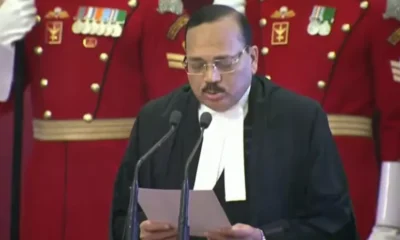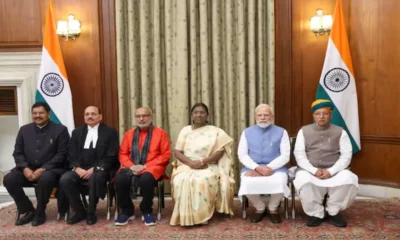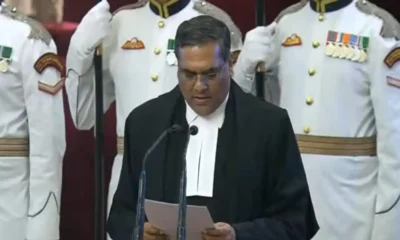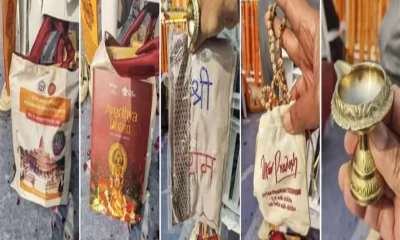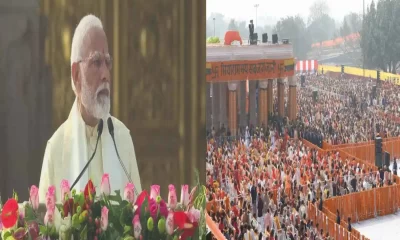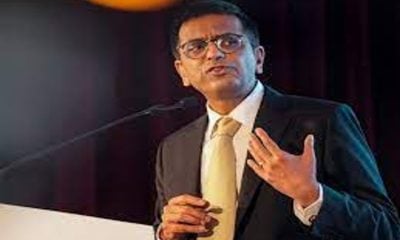The Supreme Court today (Thursday, July 11) asked the three-member mediation panel in the Ayodhya land dispute case for its status report by July 18 and said that if its finds that the talks are not working, it will commence a day-to-day hearing of the Ayodhya title dispute appeals against Allahabad High Court’s September 30, 2010 verdict from July 25.
The mediation panel is headed by Justice FM Ibrahim Kalifulla, with spiritual teacher Sri Sri Ravi Shankar and senior advocate Sriram Panchu as the other two members.
“We ask the mediation committee chairperson to give a status report. This report will be submitted by next week and we will decide on this next week. We also make it clear that in case the mediation committee says it should be concluded, we will start hearing the appeals from the July 25,” said a five-judge bench of the Supreme Court headed by Chief Justice Ranjan Gogoi today.
The court’s order seeking a progress report from the committee came on an urgent plea made by a claimant to the disputed Ramjanmabhoomi-Babri Masjid land that the mediation proceedings were making no headway whatsoever.
The panel was earlier given time till August 15 to engage in talks with the parties for an amicable settlement to heal hearts and minds.
The committee is now in the thick of its second round of talks. It finished the initial round and had filed an interim status report dated May 7 in the Supreme Court, successfully seeking more time from it.
On July 9, Rajendra Singh, survivor of Gopal Singh Visharad, an original claimant to the dispute who filed a title suit way back in 1950, said the mediation was making no headway. It was listed before a bench of Chief Justice Ranjan Gogoi and Justices S A Bobde, D Y Chandrachud, Ashok Bhushan and Abdul Nazeer.
Singh asked the CJI to stop mediation and start adjudication on the appeals pending since the past eight years in the Supreme Court.
Singh said that “he is entitled to offer worship without any obstruction according to the rites and tenets of his religion at the birthplace of Lord Shri Ram Chandra”.
Singh’s counsel, senior advocate K Parasaran said it was “difficult to settle disputes like this and the Supreme Court should authoritatively decide the matter”.
“The suit was filed in 1950, even before the Constitution came into existence. Sixty-nine years have passed since,” Parasaran submitted, highlighting the supposed futility of efforts to settle the dispute.
Senior advocate Rajeev Dhavan, lawyer for the Muslim appellants, questioned the purpose of the application filed by Singh. “This is just to intimidate us. Very serious mediation is going on. This application should have ideally asked the court to direct the mediation committee for a status report, instead it wants the court to entirely scrap the mediation process. Unhappy parties like them want to scrap the mediation efforts,” Dhavan submitted.
To this, the CJI said since the court had constituted the mediation panel, the court itself would ask the committee for a report.
“We are entitled to know what is happening,” Justice Gogoi said to Dhavan.
Justice Kalifulla has been asked to detail the progress made so far and the stage at which the mediation is currently in.
The Bench had sent the Ayodhya dispute for mediation on March 8. It had given the panel an initial deadline of eight weeks.
The eight weeks was the time given to the Muslim parties to examine the accuracy and relevance of the Uttar Pradesh government’s official translation of thousands of pages of oral depositions and exhibits in the Ayodhya title suit appeals pending since 2010 in the Supreme Court.
The committee has already held several rounds of mediation with stakeholders in Faizabad district in Uttar Pradesh of which the disputed area in Ayodhya is a part of.
The CJI had expressed hope that mediation may spell a peaceful end to the volatile dispute between the members of the two religious faiths. The Constitution Bench chose mediation despite the fact that barring the Sunni Waqf Board and the Nirmohi Akhara, one of the Hindu petitioners, all were against mediation and some Hindu parties objecting that their faith in Lord Ram’s birthplace was “non-negotiable”.
But the judges had said mediation may help in “healing relations”.The Bench had explained that the Ramjanmabhoomi-Babri Masjid case “is not about the 1500 sq. ft. of disputed land, but about religious sentiments. We know its impact on public sentiment, on body politic. We are looking at minds, hearts and healing if possible”.


 Latest world news15 hours ago
Latest world news15 hours ago
 Latest world news16 hours ago
Latest world news16 hours ago
 Latest world news15 hours ago
Latest world news15 hours ago
 India News15 hours ago
India News15 hours ago
 India News6 hours ago
India News6 hours ago
 Latest world news6 hours ago
Latest world news6 hours ago
